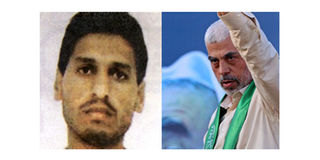ICC prosecutor seeks to confirm death of Hamas leader Deif

COMBO: Palestinian military leader of the Hamas movement, Mohammed Deif, and Yahya Sinwar, leader of the Palestinian Hamas movement. Photos | AFP
What you need to know:
- "The prosecution will withdraw its (arrest warrant) application against Deif if sufficient and reliable information confirms his death," the legal document, filed under under seal on August 2 but only revealed on Tuesday, said.
Prosecutors at the International Criminal Court are looking into the reported death of Hamas military leader Mohammed Deif and will withdraw their case against him if they can confirm it, legal filings made public on Tuesday showed.
Deif, 58, was believed to be one of the masterminds of the Oct. 7, 2023 assault on southern Israel which triggered the Gaza war, and since then had directed Hamas military operations against Israeli forces in the Palestinian enclave.
Israel said he was killed in an Israeli airstrike on Gaza's southern city of Khan Younis on July 13. Hamas has neither confirmed nor denied that.
"The prosecution will withdraw its (arrest warrant) application against Deif if sufficient and reliable information confirms his death," the legal document, filed under under seal on August 2 but only revealed on Tuesday, said.
Last Friday the ICC announced it had terminated proceedings against Hamas leader Ismail Haniyeh, who was assassinated in Iran on July 31.
The ICC is currently weighing a request for arrest warrants against Israeli and Hamas leaders made earlier this year.
In May, ICC chief prosecutor Karim Khan asked for arrest warrants for Hanyineh, Deif and the current head of Hamas Yahya Sinwar for alleged war crimes and crimes against humanity committed during the Oct. 7 attacks on Israel.
The prosecutor is also seeking warrants for the arrest of Israeli Prime Minister Benjamin Netanyahu and his defence minister Yoav Gallant for alleged war crimes and crimes against humanity during Israel's Gaza offensive.

Picture said to show leader of Hamas' military wing, known as Al-Qassam Brigades, Mohammed Deif in a location given as Gaza Strip in this handout picture released on January 7, 2024. Israel Defense Forces| Handout via REUTERS
Netanyahu said in May the ICC move was absurd and he rejected the comparison of Israel and Hamas.
Hamas also denounced the arrest warrants when they were first applied for.
There is no deadline for when judges must decide on the applications. In previous cases judges have taken anywhere from one month to up to eight months to issue requested warrants.




